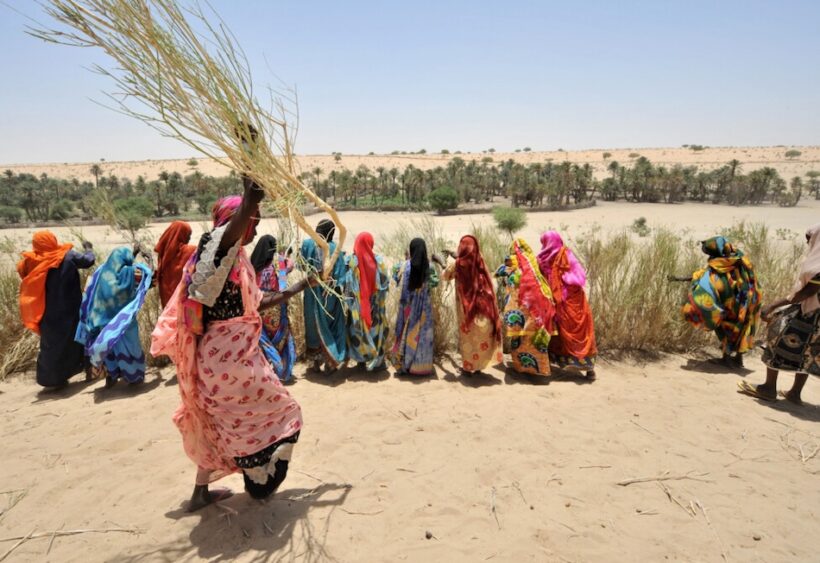This is an op-ed for IPS by Marco Knowles, head of the FAO’s social protection team.
Climate change is exacerbating inequalities between and within countries, disproportionately affecting poor households in rural areas. More than half of the resources of the poorest, a large proportion of whom are smallholder farmers, are lost to climate risks. This hurts their incomes and ability to meet their basic needs, including food.
According to the UN Food and Agriculture Organization’s (FAO) new report, The Unjust Climate, the income gap between poor and better-off rural households increases by about $21 billion a year due to flooding and by more than $20 billion a year due to heat stress.
More than a trillion dollars a year is spent on combating climate change and its impacts. But the reality is that people in vulnerable situations receive very little funding.
It is worrying that only 1.7% of climate finance reaches smallholder farmers, despite their critical role in growing the food that feeds us and managing the natural resources that determine the health of the planet.
In this context, decision-makers face a major challenge: what policy instruments can they rely on to channel climate finance to the poorest smallholder farmers to help them adapt to climate change?
The author, Marco Knowles. Image: FAO
The findings of the Unjust Climate report show that social protection policies and programs are an important part of the solution.
These programs, which include interventions such as cash transfers, public works programs, social welfare, and vocational training, are specifically designed to reach the poorest and most vulnerable.
They enable smallholder farmers to invest in new technologies, diversify their incomes, adopt new agricultural assets, and accumulate savings to better adapt to climate change.
In addition, the ministries and agencies implementing these programs have the knowledge to work with vulnerable groups, the information systems to identify them, and the payment systems to deliver assistance.
Several countries are already targeting climate finance to the poorest smallholder farmers through social protection. This is not just about helping them to survive, but about empowering individuals, households, and communities to build a better future for themselves and our planet.
In Paraguay, the Poverty, Reforestation, Energy, and Climate Change (Proeza) project has a social protection component that encourages the poorest women and indigenous peoples to adopt sustainable agroforestry practices.
By combining these cash payments with tailored technical support, smallholder farmers can adapt their farming practices to become more resilient to the droughts to which they are increasingly exposed due to climate change, and increase the production and marketing of traditional crops such as yerba mate.
In Botswana, a social protection program is building the skills of smallholder farmers, both men and women, to work as rangers and restorers. This supports healthy communal rangeland ecosystems and enables people to earn higher incomes that are less vulnerable to climate change.
In Tunisia, vulnerable smallholder farmers covered by the government’s social protection system are being lifted out of poverty through an intensive support package that combines sustainable agricultural practices, climate-resilient off-farm income generation, and in-kind support.
Evidence gathered by FAO from around the world confirms that such programs are effective in improving people’s well-being and in achieving climate change adaptation and mitigation goals.
However, despite evidence of the social and environmental benefits of targeting climate finance to smallholder farmers through social protection, there are still very few examples of this happening.
We recently reviewed programs funded by the world’s largest climate funds and found that of the 484 programs analyzed, only 3% targeted finance to smallholder farmers through social protection.
It is time to step up and take action to channel more climate finance through social protection to ensure it reaches smallholder farmers.
First, we need to share and discuss information and experiences through sustained, broad-based policy dialogue at all levels, from local to global.
This will help trigger a shift in thinking from social protection as a charity in times of need to strategic investment in the interests of inclusive, climate-resilient, low-carbon development that leaves no one behind.
Second, board members of institutions such as international climate funds (e.g. the Green Climate Fund, the Global Environment Facility, and the Adaptation Fund) and multilateral development banks (e.g. the World Bank, the African Development Bank, and the Inter-American Development Bank) that mobilize, host and channel climate finance have a key role to play in ensuring that their investment frameworks explicitly recognize the importance of social protection in inclusive climate action.
Third, we need to engage and support communities themselves to mobilize and unite behind a call to scale up social protection as a tool for inclusive climate action. Collective action at the local level, as well as by civil society associations that bring together smallholder farmers and other marginalized groups, is essential if we are all to harness the power of social protection to address the climate crisis.
We cannot meet the challenge of eradicating poverty, hunger, and malnutrition unless we, as a global community, take concrete action to enable smallholder farmers to cope with the challenges of climate change. Investing in social protection for inclusive climate action is an urgent imperative that can no longer wait.
Marco Knowles is a Senior Social Policy Officer at FAO and leads its Social Protection Team. His areas of expertise include increasing access to social protection in rural areas and using social protection for climate action. He has extensive experience in providing evidence-based support for food security policy and capacity development.










